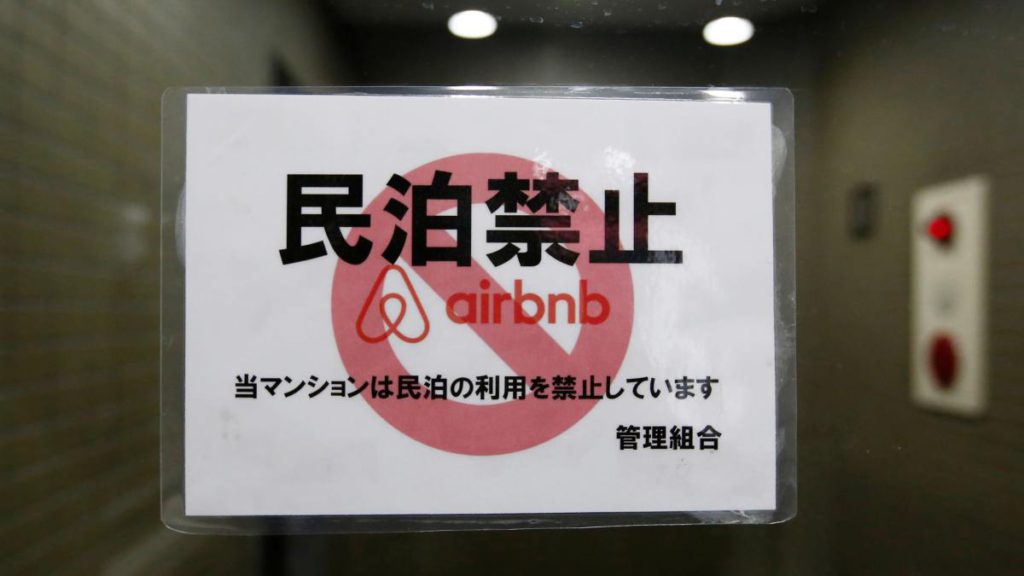
Japanese and international news outlets have widely covered the mass purging of some 80% of its 60,000 Japanese listings on Airbnb last week. Looking beyond the stranded travelers, hosts disappointed over the 180 day cap and extremely strict rules that would likely turn them away from hosting tourists again, it is a positive sign that Japan’s attempt to regulate (even though it’s probably going to be a bloody one) short term, minpaku style rentals means that Airbnb’s model is going to stay in the long run.
Airbnb is often a contentious housing issue in major cities, and Tokyo, like many other cities, have implemented strict regulations for the hospitality giant’s hosts. In this post, I want to go into my observations of the home-sharing as well as the sharing economy in the Japanese context.
Are the Japanese are unwilling to share?

Compared to China and the US, Japan’s Sharing Economy is a mere 0.005%. Japan’s adoption of the sharing model has been lukewarm even when one is optimistic. A survey conducted by PwC Japan last year has shown that only one of three persons has heard of the term “Sharing Economy” and that half of the people surveyed have no intentions of using services offered by the Sharing Economy.
The Japanese are also more likely to express concerns over safety of sharing services compared to people from the US, UK, China, Germany, India and Australia. China, with its culture of communal living and active startup scene, is perhaps the opposite of Japan, where 1K studio units are the most popular for the single worker.
Analysts have also mentioned about Japan’s preference for the new and the pristine, protectionist policies, and perhaps coupled with the emphasis of not being a nuisance to others and harmony, disruptive technologies like home-sharing and ride-sharing has been slow to take on.
However, I am sure that the Japanese are not slow and see the merits of the sharing economy as evidenced in other countries (and also problems), and you probably have pockets of young people working towards a local solution that would fit the cultural sensitivities better. Whether it takes off or not is a different matter.
Really Powerful Lobbies
Airbnb is contentious for many reasons, and many people had, and still have differing opinions on how to cut back the monster that was growing unfettered before the mass culling. As a company, Airbnb have to navigate testy waters; from residents of neighbourhoods now overrun by tourists, landlords and the powerful hospiltality and real estate industry.
Airbnb positions itself as just a platform facilitating and meeting demands of wanderlust inflicted travelers seeking exotic experiences, but Airbnb styled accomodation have been accused of causing increase in rents and property prices in the area, driving out residents by making it too expensive to live in. Hotel industries are unhappy that Airbnb hosts do not have to meet strict safety standards that hotels have to uphold, and for taking away business. Airbnb has created a cottage industry of investors hoping to receive higher returns on their investment by turning their existing investments into Airbnb style accommodation. With so much at stake, it is inevitable that everyone wants a say and a stake in the very large pie.
As a real estate developer in Tokyo, we also have seen an interest in investors asking us that they would like to turn their current lease (usually long term of two years) to Airbnb style accommodation. Under current laws, it is now not possible, but we will be evaluating developments closely.
Playing it safe and then liberalising?
There has been some talk that after this purging, we’ll be seeing an increase in listings again, as the demand is still there and Tokyo is still expecting a spike in tourists for the Rugby World Cup in 2019 and the World Cup in 2020. After all, demand will see supply and supply will be trying their best to circumvent the (extremely tight) regulations, and the government, ever so cautious, is probably just observing and then acting (albeit slowly) after weighing their options.
As a user of Airbnb myself, I can attest to the benefit of the amount of money I’ve saved compared to staying at a hotel. The homes I’ve stayed at were all safe and pleasant, and although I usually don’t ever meet the hosts, the homes were usually in interesting neighbourhoods that we could explore.
Whether these new laws are going to stifle minpaku style accommodation or help to regulate and please as many people as possible, one is is for sure, and it is that no one is really sure what is the real solution to what is being faced by many people in other parts of the world.